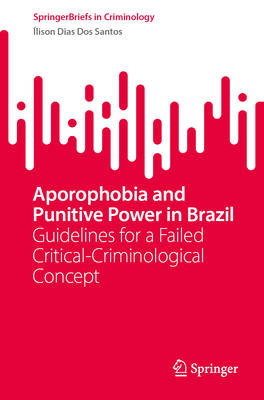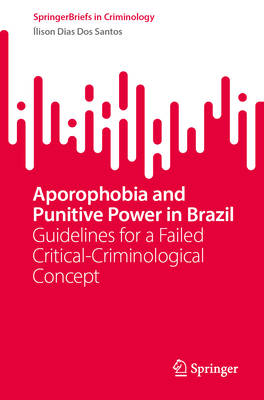
- Retrait gratuit dans votre magasin Club
- 7.000.000 titres dans notre catalogue
- Payer en toute sécurité
- Toujours un magasin près de chez vous
- Retrait gratuit dans votre magasin Club
- 7.000.0000 titres dans notre catalogue
- Payer en toute sécurité
- Toujours un magasin près de chez vous
Aporophobia and Punitive Power in Brazil
Guidelines for a Failed Critical-Criminological Concept
Ílison Dias Dos Santos
76,45 €
+ 152 points
Description
This book provides a critical and reflective analysis of the criminological movement to establish aporophobia as a framework for examining punitive power. It scrutinizes the theoretical, methodological, and political foundations of aporophobia, a concept developed in a distinct sociopolitical reality and reveals the risks of uncritically applying it to Brazil's context. It highlights how aporophobia fails to account for the central role of Brazil's history of slavery in shaping its abysmal penal selectivity, which disproportionately targets marginalized groups perceived as social pariahs. By obscuring these structural roots, this movement inadvertently legitimizes Brazil's unchecked punitive power, perpetuating the belief in criminal law as a solution to deeply embedded social issues--ultimately reinforcing what is identified as a criminology of blindness that ignores the roots of the abysmal selectivity of punitive power in Brazil. Rooted in critical criminology, the book highlights the limitations of aporophobia as a critical-criminological tool and proposes an alternative framework grounded in intersectionality and Southern epistemologies. These perspectives emphasize the importance of delegitimizing criminal law as a mechanism for addressing social inequalities while constructing a more realistic and emancipatory critique of punitive power. It also exposes the criminal policy of the "other", a caste-based model that erodes the rule of law, even under the punitive new left. Ultimately, the work calls for a criminological approach that engages directly with Brazil's historical and systemic inequalities, offering a globally informed yet locally grounded analysis of the selective exercise of punitive power.
Spécifications
Parties prenantes
- Auteur(s) :
- Editeur:
Contenu
- Nombre de pages :
- 86
- Langue:
- Anglais
- Collection :
Caractéristiques
- EAN:
- 9783032017529
- Date de parution :
- 25-10-25
- Format:
- Livre broché
- Format numérique:
- Trade paperback (VS)
- Dimensions :
- 155 mm x 235 mm

Les avis
Nous publions uniquement les avis qui respectent les conditions requises. Consultez nos conditions pour les avis.






